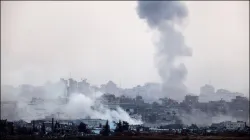Gaza health official, Hamas commander killed in airstrike as Israel pushes deeper in Rafah
Hani al-Jaafarawi, the director of Gaza's Ambulance and Emergency Department was killed in an airstrike in a medical clinic in Gaza City. The Israeli military said the strike targeted Hamas commander Mohammed Salah, who was responsible for developing the weaponry.

Gaza: As Israeli operations intensified in Rafah, Hani al-Jaafarawi, the director of Gaza's Ambulance and Emergency Department was killed in an airstrike in a medical clinic in Gaza City, according to the health ministry of the Palestinian enclave. Meanwhile, Israel's military said Mohammad Salah, one of the top Hamas commanders, was killed in the airstrike.
The health ministry said the killing of Hani al-Jaafarawi brought the number of medical staff killed by Israeli fire since Oct 7 to 500, while at least 300 others have so far been detained. The Israel Defence Forces (IDF) said the strike targeted Salah, who was responsible for developing weapons for the Hamas group.
"Salah was part of a project to develop strategic weaponry for the Hamas terrorist organisation, and he commanded a number of Hamas terrorist squads that worked on developing weapons," it said. In Rafah, near the border with Egypt, Israeli forces which took control of the eastern, southern, and central parts of the city pursued their raid into the western and northern areas, said residents, describing heavy fighting.
On Sunday, residents had said Israeli tanks had advanced to the edge of the Mawasi displaced persons' camp in the northwest of Rafah, forcing many families to leave northward to Khan Younis and to Deir Al-Balah in central Gaza, the only city in the enclave where tanks have not yet invaded. Civilians also claimed that Israeli drones and snipers were hunting people who tried to check on their houses as tanks pushed further west.
The Israeli military said forces continued "intelligence-based targeted operations" in Rafah, locating weapons and rocket launchers and killing militants "who posed threats to them." Since early May, fighting has focused on Rafah, on Gaza's southern edge where around half of the enclave's 2.3 million people had been sheltering after fleeing other areas.
When will the war end?
More than eight months into the fighting, international mediation backed by the United States has so far failed to bring a ceasefire agreement. Hamas says any agreement must bring an end the war, while Israel says it will agree only temporary pauses in fighting until Hamas is eradicated. The Israeli offensive in retaliation for the October 7 attacks by Hamas, which claimed 1,200 lives, has killed almost 37,600 people, according to Palestinian health authorities, and has left Gaza in ruins.
Israeli Prime Minister Benjamin Netanyahu on Sunday that the current phase of fighting against Hamas in Gaza is winding down, but warned that the war would not end until the Islamist group no longer controlled the Palestinian enclave. Netanyahu's latest remarks could be seen as setting the stage for Israel to send more troops to its northern border to confront the Lebanese militant group Hezbollah.
The Israeli leader said in a lengthy TV interview that while the army is close to completing its current ground offensive in the southern Gaza city of Rafah, that would not mean the war against Hamas is over. But he said fewer troops would be needed in Gaza, freeing up forces to battle Hezbollah. "We will have the possibility of transferring some of our forces north, and we will do that,” he told Israel's Channel 14, a pro-Netanyahu TV channel.
Hezbollah has said it will continue battling Israel until a ceasefire is reached in Gaza. The group's leader, Hassan Nasrallah, warned Israel last week against launching a war, saying Hezbollah has new weapons and intelligence capabilities that could help it target more critical positions deeper inside Israel. Hezbollah already has unveiled new weapons during the low-level fighting, including hard-to-defend attack drones that strike with little warning. An Israeli soldier was badly wounded Sunday in a drone strike.
(with inputs from agencies)
ALSO READ | Israeli forces strap wounded Palestinian to jeep during West Bank raid, army to probe incident
